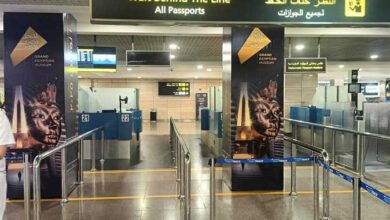Hundreds of Egyptian youth organized a series of protests across Egypt against police torture.
The protests were heavily advertized through online social networks including Facebook and Twitter.
The protests follow the alleged police torture to death of a man from Alexandria. Khaled Saeed’s death, however, was attributed to having chocked on a pack of marijuana according to police reports.
“I participated to express our impatience with [police] brutality,” said a protester from Alexandria, who preferred to remain anonymous. According to him, the plan for protesters was to gather in different areas including Azarita and San Stefano, but police managed to stop them from gathering. About 200 demonstrators then moved to Cleopatra neighborhood, where Saeed lived and stood in a silent protest in remembrance of the “torture martyr” as some banners read.
“Stories [of torture] follow one another. Death seems to be the destiny of every activist in Egypt,” the protester added. He said that he has been participating in most protests that took place following Saeed’s death.
According to other protesters, there was some violence exerted by riot police against demonstrators in the Mostafa Kamel area on the cornice of Alexandria.
Sources in Assiut of Upper Egypt told Al-Masry Al-Youm that police also circumvented a planned protest, by gathering ID cards from demonstrators. However, no arrests were made.
In Cairo, protests were planned in various spots including 6 October Bridge, Qasr el-Nil Bridge and other areas, but in many of them, police managed to disperse protesters. However, small scattered demonstrations were held in Downtown Cairo next to the Journalists Syndicate and in the Maadi neighborhood, a an area were protests are unconventional.
In Mansoura of the Delta, the National Association for Change organized a popular gathering at the Doctors Club. At the gathering, people, mostly youth, chanted calling for change, amidst a strong security presence. Police has also blocked some participants on the roads leading to the Talkha area where the gathering was supposed to take place.
“We are gathering again today to liberate Egypt like we gathered earlier in the 1970s. The uprising will soon break out,” said Abu Ezz Hariri, vice-president of the leftist Tagammu Party.
“We all know how deteriorated the education and health services are and that shows a sign of failure of the current regime to provide adequate life for citizens,” said Ossama Ghazali Harb, head of the Democratic Front Party who partook in the gathering, alongside other opposition figures such as George Ishaq of the Kefaya Movement and Mohamed Beshr of the 9 March group. “As days pass, awareness increases and young people mobilize for change,” he added.
Young online activists have called throughout the day for fellow youth to take part in the wave of protests nationwide, using a series of mobilizing messages. A message that circulated widely in the Egyptian Twitter sphere read, “Khaled Saeed could be your brother, your father, your friend and if you keep silent, the next Khaled Saeed will most likely be you.”




